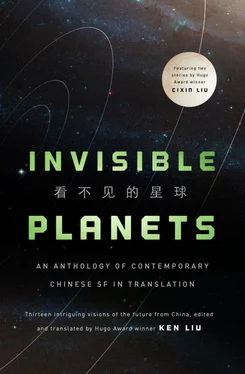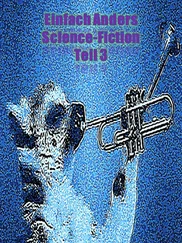Pretending that the fake is real only makes the real seem fake.
I walk slowly toward the eastern end of the street until I stop under the Old Ghost Tree. The sweet fragrance of osmanthus fills the foggy night air, cool and calming. Suddenly I want to climb into the tree. That way, no one will find me.
The Old Ghost Tree leans down with its branches to help.
I sit hidden among the dense branches and feel calmer. The crows perch around me, their glass eyes showing hints of a dark red glow. One of them speaks. “Ning, this is a beautiful night. Why aren’t you at Lanruo Temple, stealing vegetables?”
The crow is asking a question to which it already knows the answer. The Old Ghost Tree knows everything that happens on Ghost Street. The crows are its eyes and ears.
“How can I know for sure,” I ask, “that I’m a real person?”
“You can chop off your head,” the crow answers. “A real person will die with his head cut off, but a ghost will not.”
“But what if I cut off my head and die? I’ll be no more.”
The crow laughs, the sound grating and unpleasant to listen to. Two more crows fly down, holding in their beaks antique bronze mirrors. Using the little moonlight that leaks through the leaves, I finally see myself in the mirrors: small face, dark hair, thin neck. I lift the hair off the back of my neck, and in the double reflections of the mirrors, I see a crimson bar code against the skin, like a tiny snake.
I remember Xiao Qian’s cool hands against my spine on that hot summer night. I think and think until tears fall from my eyes.
WINTER SOLSTICE, THE TWENTY-SECOND SOLAR TERM:
This winter has been both dry and cold, but I often hear the sound of thunder in the distance. Xiao Qian says it’s the Thunder Calamity, which happens only once every thousand years.
The Thunder Calamity punishes demons and ghosts and lost spirits. Those who can escape it can live for another thousand years. Those who can’t will be burned away until no trace is left of them.
I know perfectly well that there’s no such thing as a “Thunder Calamity” in this world. Xiao Qian has been a ghost for so long that she’s now gone a little crazy. She holds on to me with her cold hands, her face as pale as a sheet of paper. She says that to hide from the Calamity, a ghost must find a real person with a good heart to stay beside her. That way, just as one wouldn’t throw a shoe at a mouse sitting beside an expensive vase, the Duke of Thunder will not strike the ghost.
Because of her fear, my plan to leave has been put on hold. In secret I’ve already prepared my luggage: a few stolen potatoes, a few old shirts. My body isn’t growing any more anyway, so these clothes will last me a long time. I didn’t take any of the old copper coins from Xiao Qian, though. Perhaps the outside world does not use them.
I really want to leave Ghost Street. I don’t care where I go; I just want to see the world. Anywhere but here.
I want to know how real people live.
But still I linger.
* * *
On Winter Solstice it snows. The snowflakes are tiny, like white sawdust. They melt as soon as they hit the ground. Only a very thin layer has accumulated by noon.
I walk alone along the street, bored. In past years I would go to Lanruo Temple to find Yan Chixia. We would knock an opening in the ice covering the lotus pond and lower our jury-rigged fishing pole. Winter catfish are very fat and taste fantastic when roasted with garlic.
But I haven’t seen Yan Chixia in a long time. I wonder if his beard and hair have grown out a bit.
Thunder rumbles in the sky, closer, then farther away, leaving only a buzzing sensation in my ears. I walk all the way to the Old Ghost Tree, climb up into its branches, and sit still. Snowflakes fall all around me, but not on me. I feel calm and warm. I curl up and tuck my head under my arms, falling asleep like a bird.
In my dream, I see Ghost Street turning into a long, thin snake. The Old Ghost Tree is the head, Lanruo Temple the tail, the slate slabs the scales. On each scale is drawn the face of a little ghost, very delicate and beautiful.
But the snake continues to writhe as though in great pain. I watch carefully and see that a mass of termites and spiders is biting its tail, making a sound like silkworms feeding on mulberry leaves. With sharp mandibles and claws, they tear off the scales on the snake one by one, revealing the flesh underneath. The snake struggles silently, but disappears inch by inch into the maws of the insects. When its body is almost completely eaten, it finally makes a sharp cry and turns its lonesome head toward me.
I see that its face is Xiao Qian’s.
I wake up. The cold wind rustles the leaves of the Old Ghost Tree. It’s too quiet around me. All the crows have disappeared to who knows where, except one that is very old and ugly. It’s crouching in front of me, its beak dangling like the tip of a long mustache.
I shake it awake, anxious. It stares at me with two broken-glass eyes, croaking to me in its mechanical, flat voice, “Ning, why are you still here?”
“Where should I be?”
“Anywhere is good,” it says. “Ghost Street is finished. We’re all finished.”
I stick my head out of the leaves of the Old Ghost Tree. Under the slate gray sky, I see the murder of crows circling over Lanruo Temple in the distance, cawing incessantly. I’ve never seen anything like this.
I jump down from the tree. As I run along the narrow street, I pass dark doors and windows. The cawing of the crows has awakened many of the ghosts, but they don’t dare to go outside where there’s light. All they can do is peek out from cracks in doors, like a bunch of crickets hiding under houses in winter.
The old walls of Lanruo Temple, long in need of repairs, have been pushed down. Many giant mechanical spiders made of steel are crawling all over the main hall, breaking off the dark red glass shingles and sculpted wooden molding piece by piece and throwing the pieces into the snow on the ground. They have flat bodies, blue-glowing eyes, and sharp mandibles, as ugly as you can imagine. From deep within their bodies comes a rumbling noise like thunder.
The crows swoop around them, picking up bits of broken shingles and bricks on the ground and dropping them on the spiders. But they are too weak, and the spiders ignore them. The broken shingle pieces strike against the steel shells, making faint, hollow echoes.
The vegetable garden has been destroyed. All that remains are some mud and pale white roots. I see one of the Monk’s rusted arms sticking out of a pile of broken bricks.
I run through the garden calling for Yan Chixia. He hears me and slowly walks out of his cabin. He’s still wearing his battle gear: sedge hat on his head, the sword Demon Slayer in his hand. I want to shout for him to fight the spiders, but somehow I can’t spit the words out. The words taste like bitter, astringent paste stuck in my throat.
Yan Chixia stares at me with his sad eyes. He comes over to hold my hands. His hands are as cold as Xiao Qian’s.
We stand together and watch as the great and beautiful main hall is torn apart bit by bit, collapses, turns into a pile of rubble: shingles, bricks, wood, mud. Nothing is whole.
They’ve destroyed all of Lanruo Temple: the walls, the main hall, the garden, the lotus pond, the bamboo grove, and Yan Chixia’s cabin. The only thing left is a muddy ruin.
Now they’re moving on to the rest of Ghost Street. They pry up the slate slabs, flatten the broken houses along the sides of the street. The ghosts hiding in the houses are chased into the middle of the street. As they run, they scream and scream while their skin slowly burns in the faint sunlight. There are no visible flames. But you can see the skin turning black in patches, and the smell of burning plastic is everywhere.
Читать дальше












